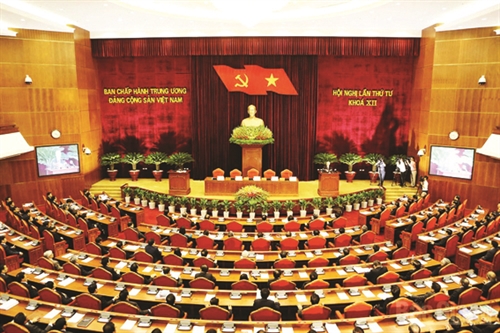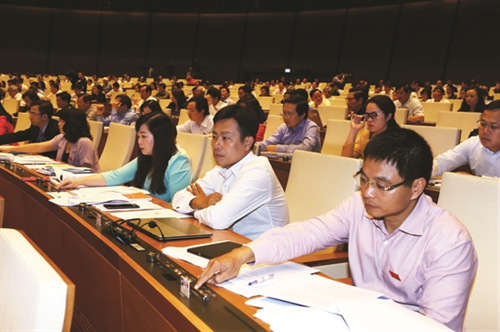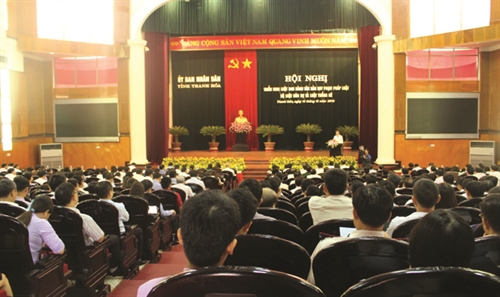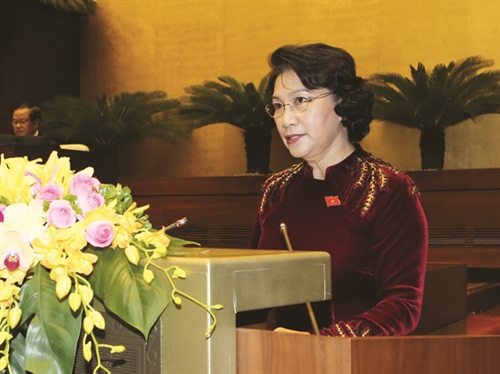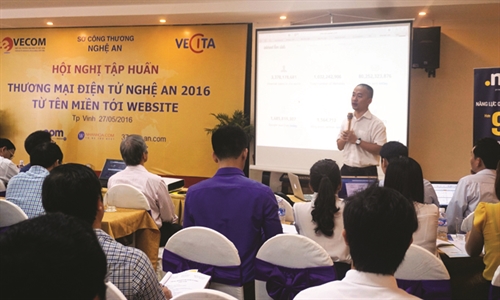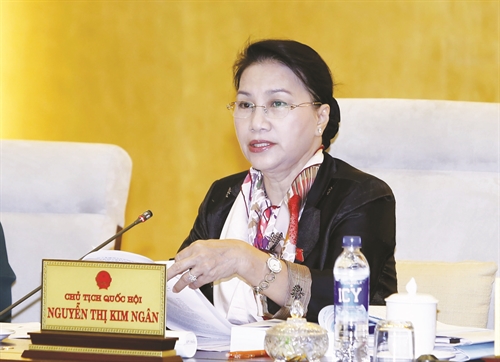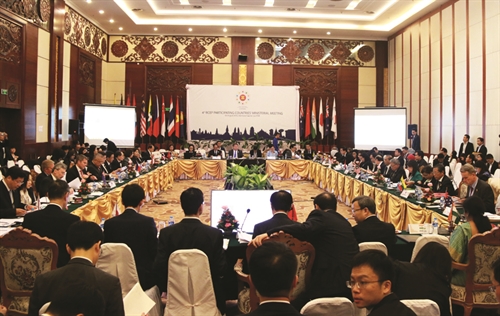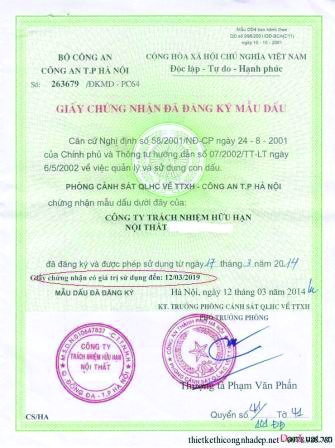Vietnam’s ongoing efforts to renew the growth model aim to raise growth quality and economic productivity and competitiveness, states a Party resolution issued early this month.
Party General Secretary Nguyen Phu Trong signed Resolution No 05-NQ/TW during the fourth plenum of the XIIth Party Central Committee, which reaffirms the country’s resolve to pursue fast and sustainable comprehensive development in economic, social and environmental aspects.
The resolution, however, stresses that the country will not boost growth at any cost, avoiding adverse impacts on macroeconomic stability, national defense, security, social progress, equity, and the environment.
The resolution charts out that the country’s growth model will pay greater attention to and increasingly rely on labor productivity-increasing factors and effective use of resources. Special importance will be attached to bringing into full play the spirit of patriotism, national pride and self-esteem and creative mind of the Vietnamese people and scientific and technological achievements of mankind, as well as all potentials and strengths of industries, fields and localities and the whole country.
Each industry, sector and locality will, depending on its practical conditions, reasonably combine extensive growth and intensive growth, regarding intensive growth as the decisive direction.
The country will boost growth on the basis of not only investment and export but also domestic market. Instead of increasing the quantity of input production factors, the country will strive to heighten its labor productivity and quality, application of science and technology and innovation and creativity. Exploitation and making the maximum use of internal resources will be combined with attraction and efficient use of external ones.
The resolution reiterates that renewal of the growth model will be closely associated with making three strategic breakthroughs and restructuring the economy.
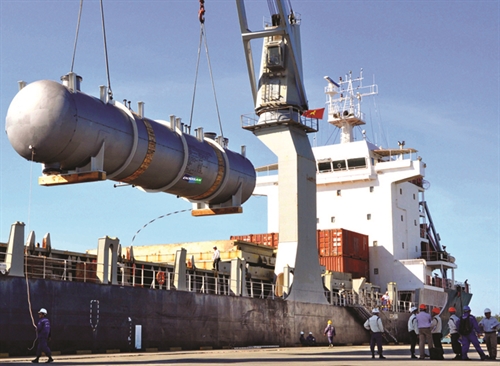 |
| Loading a boiler manufactured by Doosan Heavy Industries Vietnam Co. Ltd., onto a ship at Dung Quat seaport (Quang Ngai province) for export __Photo: Nguyen Dang Lam/VNA collaborator |
Quantitative targets
The resolution says the country will maintain inflation rates below 5 percent per year and reduce state budget deficit rates to less than 4 percent of gross domestic product (GDP) by 2020, and about 3 percent of GDP by 2030.
The country will strive to keep public debt at not more than 65 percent of GDP from 2016-20, with government debt not exceeding 55 percent of GDP and foreign debt hitting 50 percent of GDP at most.
These caps will drop to 60 percent, 50 percent and 45 percent, respectively, by 2030.
About 30-35 percent of nationwide enterprises will have creative and innovative activities, and average growth in labor productivity is set at more than 5.5 percent per year over the next five years.
By 2020, the ratio of trained workers is expected to reach 25 percent, and the ratio of agricultural laborers to fall below 40 percent.
Total-factor productivity (TFP) is set to contribute 30-35 percent to economic growth during 2016-20.
The gap between Vietnam’s competitiveness and that of ASEAN-4 countries, namely Indonesia, Malaysia, the Philippines and Thailand, will be narrowed.
Major policies
In the coming time, the resolution says, Vietnam will continue stabilizing and strengthening its macro-economic foundations, properly control inflation and ensure major balances of the economy.
The country will rearrange state budget revenues and expenditures and restructure public debts to ensure safety and sustainability. It will also handle bad debts along with restructuring the system of credit institutions, particularly weak ones.
It will refine the institutions on equitization and valuation of state enterprises; institutions on property and property rights (including rights to own, use, dispose of and benefit from property; and institutions on markets of production elements in order to ensure that the market will play a major role in mobilizing and distributing resources.
The country will pursue a more balanced development of its financial markets, between monetary and capital markets; share and bond markets; government and corporate bonds, and credit and non-credit banking services. Attention will be paid to developing the venture capital market and consumption credit.
The country will improve the institutions on management of public investment in conformity with international practices.
It will step up administrative reforms to improve the business climate and strengthen business confidence.
It will create favorable conditions for start-ups and business innovators. It will attract selectively foreign investment projects and boost connections between foreign and domestic economic sectors.
Vietnam will revise the law on land with a view to encouraging and facilitating the accumulation of agricultural land, and vigorously develop the primary and secondary markets of land use rights, especially agricultural land.
It will further improve the law on labor and labor market to facilitate the flow of labor in the country.
The country will complete policies and laws on as well as enhance law enforcement capacity in environmental protection, tackle environmental pollution, supervise cross-border pollution, and effectively respond to climate change.
Special institutions will be studied and introduced for dynamic localities, economic regions and special administrative-economic zones so that they can well play their leading role in socio-economic development.
Vietnam will continue implementing investment projects through public-private partnerships, and concentrate public investment and investment from other sources on core infrastructure projects and in key economic regions.
It will early form some special administrative-economic zones, and smart cities.
Importance will be attached to education and training in order to raise quality of human resources. Social resources will be attracted to public universities, colleges and vocational schools while businesses will be called to participate in providing vocational training.
Considering technology transfer an essential factor for enhancing productivity, quality and competitiveness of the economy, the country will encourage and create favorable conditions for businesses to participate in science and technology research, development and transfer. It will further develop industrial parks and hi-tech zones and build proper policies for technology imports.
The resolution says that Vietnam will push ahead the restructuring of state corporations. equitization and divestment of state capital. Equitized businesses must be listed on the securities market within one year after their initial public offerings. The state-owned holdings will be lowered to levels sufficient to substantially change business governance.
The country will build a plan on forming a specialized body to represent the owner (the State) of state enterprises in order to abolish the owner-representing function of ministries and people’s committees with regard to state capital and assets in businesses. It will resolutely handle state enterprises suffering losses or with inefficient investments, letting them go bankrupt in accordance with law.
The country will tackle “cross-ownership” among credit institutions and urge commercial banks to withdraw their investments in irrelevant sectors. It will issue regulations to support the handling of bad debts and restructuring of credit institutions, and arrange appropriate resources for quickly and thoroughly handling these debts.
Vietnam also aims to develop a clean, hi-tech and environmentally friendly agriculture, focusing on products that are the advantages of each locality, each region and the whole country. The country will adopt mechanisms and policies to attract investments from businesses in agriculture and rural areas. It will strive to build brand names for local farm produce, and modernize rural infrastructure to cope with climate change.
It will devise a national industrial policy, concentrating resources on underpinning industries and key industrial products and boosting the development of manufacturing and processing industries, especially spare parts industries to better take part in global value chains.
Regarding services, those with potential and high knowledge and technological content, such as banking and finance, maritime and logistics, oil and gas, aviation, healthcare, auditing and consultancy, will be prioritized for development. Tourism is projected to become an economic spearhead of the nation by 2020.
Particularly, according to the resolution, Vietnam will vigorously develop the private economic sector as a crucial driving force for economic development. It will promote the formation and development of strong private corporations that can compete with foreign companies.
Vietnam will also strongly develop marine economic activities and encourage all economic sectors to invest in developing oil and gas exploitation and processing; seaports, shipbuilding and repair, and ocean shipping; fishing and fishing logistic services; and marine tourism.
The resolution says Vietnam will renew state management work toward building a managing and serving state with a streamline and effective apparatus and incorruptible staff.- (VLLF)
Key institutional and legal tasks in the coming time
|
